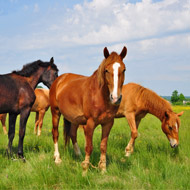
Disease causes severe pneumonia and can affect other organs
US researchers have made a significant breakthrough in the pursuit of a vaccine against Rhodococcus equi.
A study published in PLOS One describes the trial of a vaccine, which scientists say has the potential to save thousands of foals every year. The research was carried out by researchers at Texas A&M University and Harvard Medical School.
Senior author Dr Noah Cohen said: “After many decades of efforts, our research, funded by the Morris Animal Foundation, has led to the first effective vaccine protecting folks against infection with R.equi, considered the most common and important form of pneumonia in foals older than a few weeks of age.”
R. equi is a deadly disease that causes severe, insidiously progressive pneumonia. With a 20 to 40 per cent fatality rate, the condition can also affect the bones, abdominal lymph nodes, joints, eyes and brain.
In the trial, Dr Cohen and his team set out to see if vaccinating mares at three and six weeks prior to the birth of their foals could protect their young against foal pneumonia.
They found that antibodies that ward off pneumonia were transferred to the foals via the mares’ colostrum, which was critical to establish as horses lack the ability to transfer antibodies through the placenta. Most importantly, those antibodies were able to protect almost all the foals born to vaccinated mares from contracting pneumonia.
The team then carried out a small, randomised, controlled study of nine foals with R.equi. Five foals were given serum with high levels of antibodies against R equi and four were not. All five foals receiving the hyperimmune serum were protected against R equi pneumonia, whereas the foals that received standard plasma all developed pneumonia.
Researchers say that while further safety testing is ongoing, the early results appear to support the safe and effective use of this novel foal vaccine. Furthermore, the results suggest that immunising donor horses with the vaccine could be used to produce plasma, which foals could be transfused to prevent R. equi pneumonia.



 The RCVS has announced a new version of its 1CPD mobile app, with enhanced features for veterinary surgeons and veterinary nurses to record their continuing professional development.
The RCVS has announced a new version of its 1CPD mobile app, with enhanced features for veterinary surgeons and veterinary nurses to record their continuing professional development.